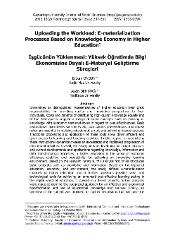| dc.contributor.author | Öngün, Erdem | |
| dc.date.accessioned | 2020-09-02T11:08:47Z | en_US |
| dc.date.available | 2020-09-02T11:08:47Z | en_US |
| dc.date.issued | 2013 | en_US |
| dc.identifier.issn | 1303-0094 | en_US |
| dc.identifier.issn | 2149-5459 | en_US |
| dc.identifier.uri | https://hdl.handle.net/20.500.12469/3318 | |
| dc.identifier.uri | https://search.trdizin.gov.tr/yayin/detay/227065 | |
| dc.description.abstract | Universities as distinguished representatives of higher education bear great
responsibilities for providing quality and innovative perspectives to their
individuals. Costs and benefits of distributing high quality knowledge equally and
of the best quality suggest a merge of some concepts such as learning or
knowledge with economic resourcefulness in regard to cost-effectiveness. Basic
instructional instruments such as syllabi, curriculums, presentations, and course
notes are essential in realizing educational targets and achieving desired success.
Traditional processing and application of these tools slows down efficient and
quick access to learning and teaching activities. In this regard, e-materializing
these instructional dynamics creates an accelerated and facilitated progression of
educational activities. Overall, this study aims at developing an insight into past
and current developments and applications regarding knowledge, information and
data transformation processes in higher education in the sense of economic
efficiency, usability, and productivity for achieving an innovative learning
environment. Based on the relevant literature, this analysis first of all introduces
basic concepts such as knowledge and information. Based on the tripod of
education, economy, and environment, the study defines e-materialization
channels in higher education and it further questions possible ways and
technological tools for achieving an enhanced cost-effective learning setting in
the digital world of education. Discussed in different aspects, further analyses
were made concerning the suggested approach for an effective and economical
transformation and use of educational knowledge and sources. Finally, an
overview of the subject was provided for further discussions that will pave the way for maintaining a cost-effective and efficient learning environment for higher
education with new concepts and forms. | en_US |
| dc.description.abstract | Yüksek öğretimin seçkin temsilcileri olarak üniversiteler bireylerine kaliteli ve
yenilikçi bakış açıları sunma konusunda büyük sorumluluklar taşımaktadır. Böyle
yüksek kalitede olduğu kadar en iyi bilgiyi sunma, uygun maliyet açısından
ekonomik kaynak zenginliğine bağlı olarak öğrenme ve bilgi gibi kavramlarının bir
bileşiminin kullanımını öngörür. Müfredat, ders programları ve ders notları gibi
temel öğretim araçları eğitimsel amaçlarının gerçekleştirilmesinde ve istenilen
başarının elde edilmesinde önemli rol oynamaktadır. Bu araçlarını geleneksel
olarak işlenmesi ve uygulanması eğitim ve öğretim faaliyetlerine olan hızlı ve etkin
ulaşımı yavaşlatmaktadır. Bu bağlamda bu öğretim dinamiklerinin emateryalleştirilmesi eğitim faaliyetlerinin hızlandırılmış ve kolaylaştırılmış şekilde
ilerlemesini sağlar. Genel olarak bu çalışma yenilikçi bir öğrenme ortamının
yaratılabilmesi için ekonomik yeterlilik, kullanılabilirlik ve üretkenlik anlamında
yüksek öğretimde edinilmiş bilgi (knowledge) ve aktarılmış bilgi (information) ve
veri dönüşümü süreçlerine ilişkin geçmiş ve mevcut gelişim ve uygulamalara
ilişkin bir öngörü geliştirmeyi amaçlamaktadır. İlgili literatüre dayanarak bu analiz
öncelikle edinilmiş bilgi (knowledge) ve aktarılmış bilgi (information) gibi temel
kavramları ortaya koyan bir giriş yapar. Eğitim, ekonomi ve çevre gibi üçayak
üzerine oturtulan çalışma yüksek öğretimde e-materyal geliştirme kanallarını
tanımlayarak dijital eğitim dünyasında uygun maliyet ile öğrenme ortamları
geliştirmenin olası yöntemlerini ve teknolojik araçlarını sorgular. Çalışmada farklı
açılardan tartışılarak eğitim bilgi ve kaynaklarını ekonomik ve etkin dönüşümüne
ve kullanımına ilişkin önerilen yaklaşım doğrultusunda analizler yapılmıştır. Son
olarak, araştırma genel bir bakış açısıyla değerlendirilmiş ve gelecekte yüksek
öğretimde yeni kavram ve formlar ışığında uygun maliyet ve etkin öğrenme
ortamlarının sağlanmasına yönelik tartışmalara yer verilmiştir. | en_US |
| dc.language.iso | tur | en_US |
| dc.publisher | Gaziantep Üniv. Sosyal Bilimler Enst. | en_US |
| dc.rights | info:eu-repo/semantics/openAccess | en_US |
| dc.subject | Knowledge Economy | en_US |
| dc.subject | Learning Economy | en_US |
| dc.subject | Cost-effectiveness | en_US |
| dc.subject | E-materialization | en_US |
| dc.subject | Technology | en_US |
| dc.subject | E-learning | en_US |
| dc.subject | Environment | en_US |
| dc.subject | Educational Green Data | en_US |
| dc.subject | Bilgi Ekonomisi | en_US |
| dc.subject | Öğrenme Ekonomisi | en_US |
| dc.subject | Maliyet Uygunluğu | en_US |
| dc.subject | E-materyal geliştirme | en_US |
| dc.subject | Teknoloji | en_US |
| dc.subject | E-öğrenme | en_US |
| dc.subject | Çevre | en_US |
| dc.subject | Eğitim Yeşil Verisi | en_US |
| dc.title | İşgücünün Yüklenmesi: Yüksek Öğretimde Bilgi Ekonomisine Dayalı E-Materyal Geliştirme Süreçleri | en_US |
| dc.type | article | en_US |
| dc.identifier.startpage | 337 | en_US |
| dc.identifier.endpage | 351 | en_US |
| dc.relation.journal | Gaziantep Üniversitesi Sosyal Bilimler Dergisi | en_US |
| dc.identifier.issue | 2 | en_US |
| dc.identifier.volume | 12 | en_US |
| dc.department | Yüksekokullar, Yabancı Diller Yüksekokulu | en_US |
| dc.institutionauthor | Öngün, Erdem | en_US |
| dc.relation.publicationcategory | Makale - Ulusal Hakemli Dergi - Kurum Öğretim Elemanı | en_US |
| dc.identifier.trdizinid | 227065 | en_US |
















